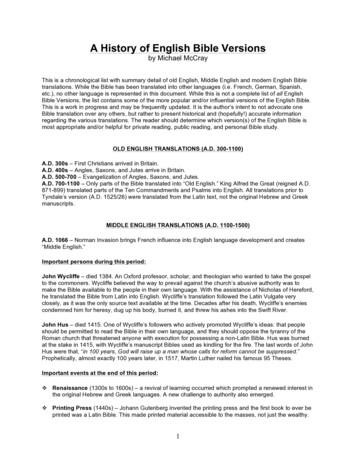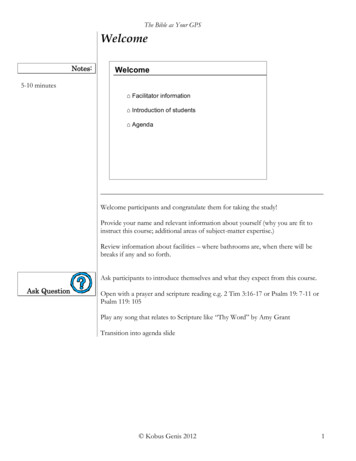
Transcription
“Not many books should be recommended for both beginning Bible readers andmature Bible readers, but this is one of them. Utilizing brief and pointed expositionsof often overlooked Bible verses, John Piper helpfully explains why we should bereading the Bible, the work of the Spirit in our Bible reading, and the fundamentalskills and habits of faithful Bible reading. I cannot imagine a serious Christian whowould not benefit from a thoughtful reading of this book.”D. A. Carson, Research Professor of New Testament, Trinity EvangelicalDivinity School; Cofounder, The Gospel Coalition“I have been reading the Bible daily for thirty-five years. Reading the Bible Supernaturally challenged my motives, effort, and enjoyment. I doubt I will read theScriptures the same way again. I look forward to deeper and more wonderful timesalone in the Word in the days ahead. This book is a must-read for anyone wantingto take Bible study seriously.”Francis Chan, New York Times best-selling author, Crazy Love andForgotten God“Stunning. Profound. Powerful. Reading the Bible Supernaturally will move youto captivated and awestruck worship at the Divine’s plan for his Word as an instrument to magnify his unrivaled glory. Seeing and savoring the God of the Scripturesis an extraordinarily high calling every believer must pursue, and no man can moveus to that place quite like John Piper. This book, accessibly written and weighty incontent, is so much more than a manual or study guide to the Scriptures. Rather, it’san invitation to the experience God intended we have with his Word—an experiencethat is Spirit dependent, faith building, and worship inciting.”Louie Giglio, Pastor, Passion City Church, Atlanta; Founder, PassionConferences; author, The Comeback“The seemingly mundane topic of reading the Bible ushers us into a world of supernatural grace for sinners. With constant reference to the Holy Scriptures, JohnPiper shows us how to beware the leaven of the Pharisees and to read by the light ofChrist. Yet Piper commends no passive mysticism, but studious labor over the bestof books; he is thorough, practical, and engaging throughout. Take up and read!”Joel R. Beeke, President, Puritan Reformed Theological Seminary“Reading the Bible Supernaturally reminds us why we cannot rest until every person on earth has access to the Bible in their own tongue. Tribes, languages, peoples,and nations are perishing without access to, or opportunity to know, this gloriousGod through this glorious book. John Piper stokes the urgency of our calling asthe church of Jesus Christ to deepen our appreciation for the Word that God usestoward a missional end—his global and eternal glory.”Michael Oh, Global Executive Director, the Lausanne Movement
“Reading the Bible Supernaturally is a thorough and compelling wake-up call tolethargic, passive, resistant, mechanical Bible readers (which is all of us at one pointor another) to become hungry, eager, inquisitive, aggressively observant minersfor the treasure in the text—fully expectant that God will bring us from death tolife, from foolishness to wisdom, from damning despair to glorious hope throughhis Word.”Nancy Guthrie, Bible teacher; author, Seeing Jesus in the Old TestamentBible study series“If you disconnect the Bible from God’s glory, you lose your grip on both. Whatterrible things we hear people say about each of them, taken in isolation. John Piperputs them together, and finds himself preaching an astonishingly high doctrine ofScripture, right alongside an intimately experiential doctrine of God’s glory. Reading the Bible Supernaturally is not just one of the helpful activities that make upthe Christian life. Kept in proper context, seen in full perspective, and received inwide-awake recognition of the living voice of the triune God, reading the Bible is thecentral act of Christian existence. This book, a kind of extended Christian hedonistgloss on Psalm 119, is an invitation to the miracle of Bible reading.”Fred Sanders, Professor of Theology, Torrey Honors Institute, BiolaUniversity; author, The Deep Things of God: How the Trinity ChangesEverything“No book has inspired me to approach Scripture with as much anticipation asReading the Bible Supernaturally. Read this book at your own risk, for it will igniteyour devotional life. You will find yourself actively hunting for treasure in the Bible,looking carefully at each passage, praying and trusting that God himself will openyour eyes to see and savor his glory. Don’t let the length of this book fool you; itis clear, accessible, and inspiring. In fact, it is the most practical, passionate, andmotivating book on reading the Bible I have ever read. Read it. Apply it. Test it. Itwill transform your approach to God’s Word.”Vaneetha Rendall Risner, author, The Scars That Have Shaped Me“Having read Reading the Bible Supernaturally, readers will not return to Scripture carelessly or indifferently but with renewed and stimulated appetite to meetwith the God of glory who inspired it and can be found and freshly encounteredthrough its pages. John Piper’s own insatiable appetite for fellowship with Godcommunicates inspiringly.”Terry Virgo, Founder, Newfrontiers
Reading the Bible Supernaturally
Reading the BibleSupernaturallySeeing and Savoring the Glory of God in ScriptureJohn Piper W H E AT O N , I L L I N O I S
Reading the Bible Supernaturally: Seeing and Savoring the Glory of God in ScriptureCopyright 2017 by Desiring God FoundationPublished by Crossway1300 Crescent StreetWheaton, Illinois 60187All rights reserved. No part of this publication may be reproduced, stored in a retrievalsystem, or transmitted in any form by any means, electronic, mechanical, photocopy,recording, or otherwise, without the prior permission of the publisher, except as providedfor by USA copyright law. Crossway is a registered trademark in the United States ofAmerica.Cover design: Josh DennisFirst printing 2017Printed in the United States of AmericaUnless otherwise indicated, Scripture quotations are from the ESV Bible (The Holy Bible,English Standard Version ), copyright 2001 by Crossway, a publishing ministry of GoodNews Publishers. Used by permission. All rights reserved.Scripture quotations marked KJV are from the King James Version of the Bible.Scripture quotations marked NASB are from The New American Standard Bible .Copyright The Lockman Foundation 1960, 1962, 1963, 1968, 1971, 1972, 1973, 1975,1977, 1995. Used by permission.Scripture quotations marked TEV are taken from the Good News Bible in Today’s EnglishVersion – Second Edition, Copyright 1992 by American Bible Society. Used by Permission.All emphases in Scripture quotations have been added by the author.Hardcover ISBN: 978-1-4335-5349-3ePub ISBN: 978-1-4335-5352-3PDF ISBN: 978-1-4335-5350-9Mobipocket ISBN: 978-1-4335-5351-6Library of Congress Cataloging-in-Publication DataNames: Piper, John, 1946– author.Title: Reading the Bible supernaturally : seeing and savoring the glory of God in Scripture / John Piper.Description: Wheaton, Illinois : Crossway, 2017. Includes bibliographical references and indexes.Identifiers: LCCN 2016029650 (print) LCCN 2016031894 (ebook) ISBN 9781433553493 (hc) ISBN9781433553509 (pdf) ISBN 9781433553516 (mobi) ISBN 9781433553523 (epub)Subjects: LCSH: Bible— Reading. Bible— Devotional use. Glory of God— Biblical teaching.Classification: LCC BS617 .P56 2017 (print) LCC BS617 (ebook) DDC 220.6— dc23LC record available at https:// lccn .loc .gov /2016 0 2 9 6 50Crossway is a publishing ministry of Good News 43182171
Toall who have helped me seethe light of the glory of God in Scripture,a legacy of shared illumination
ContentsPreface 15Introduction 19Part 1The Ultimate Goal of Reading the BibleIntroduction to Part 1: The Proposal 371 Reading the Bible toward God’s Ultimate Goal 41“Whatever you do, do all to the glory of God.”2 Reading the Bible toward White-Hot Worship 55“Because you are lukewarm, . . . I will spit you out of mymouth.”3 Reading to See Supreme Worth and Beauty, Part 1 65“When you read this, you can perceive my insight into themystery of Christ.”4 Reading to See Supreme Worth and Beauty, Part 2 75“When one turns to the Lord, the veil is removed.”5 Reading to See Supreme Worth and Beauty, Part 3 87“My eyes have seen the King, the Lord of hosts!”6 Reading to Savor His Excellence, Part 1 99“You have tasted that the Lord is good.”7 Reading to Savor His Excellence, Part 2 117“These things I speak . . . that they may have my joy.”
8 Reading to Be Transformed, Part 1 135“We all . . . , beholding the glory of the Lord, are beingtransformed from one degree of glory to another.”9 Reading to Be Transformed, Part 2 151“Their abundance of joy . . . overflowed in . . . generosity.”10 Reading toward the Consummation 163“Ransomed . . . for God from every tribe.”Part 2The Supernatural Act of Reading the BibleIntroduction to Part 2 17911 The Necessity and Possibility of Reading the BibleSupernaturally 183“He opened their minds to understand the Scriptures.”12 Why the Pharisees Couldn’t Read 197“Have you never read . . . the Scriptures?”13 New Testament Pictures of Bible Reading as aSupernatural Act 211“Receive with meekness the implanted word.”Part 3The Natural Act of Reading the Bible SupernaturallyIntroduction to Part 3 22514 God Forbid That We Despise His Natural Gifts 231“Think over what I say, for the Lord will give youunderstanding in everything.”15 Humility Throws Open a Thousand Windows 243“He leads the humble in what is right, and teaches thehumble his way.”
16 The Indispensable Place of Prayer in Reading the BibleSupernaturally: Wakening Our Desire for the Word 251“Incline my heart to your testimonies, and not to selfishgain.”17 The Indispensable Place of Prayer in Reading the BibleSupernaturally: To See, Savor, and Love with a United Heart 263“Open my eyes, that I may behold wondrous things out ofyour law.”18 Reading the Bible by Faith in the Promises of God 277“I live by faith in the Son of God, who loved me and gavehimself for me.”19 Reading the Bible by Faith in His Promise to Instruct Us 285“Good and upright is the Lord; therefore he instructssinners in the way.”20 The Ordinary Aim of Reading: The Meaning of Meaning 295“We are not writing to you anything other than what youread and understand.”21 The Ordinary Aim of Reading: Five Reasons to DefineMeaning as What the Author Intended to Communicate 303“I wrote to you in my letter . . . not at all meaning . . .”22 The Ordinary Aim of Reading: God’s Intention throughMan’s Intention 313“The things I am writing to you are a command of theLord.”23 The Power of Patience and Aggressive Attentiveness 325“If you seek it like silver and search for it as for hiddentreasures . . .”24 Active Reading Means Asking Questions 339“Think over what I say, for the Lord will give youunderstanding.”25 Asking Questions about Words and Phrases 351“The unfolding of your words gives light; it impartsunderstanding to the simple.”
26 Propositions: Collections of Nuggets or Links in a Chain? 365“He spoke boldly, reasoning and persuading . . .”27 Querying the Text about Paradoxes, Pleasures, and aTransformed Life 375“The sum of your word is truth, and every one of yourrighteous rules endures forever.”Conclusion 391Appendix: Arcing 395A Word of Thanks 412General Index 414Scripture Index 423Desiring God Note on Resources 432
Spiritually to understand the Scripture, is to have the eyes of themind opened, to behold the wonderful spiritual excellency of theglorious things contained in the true meaning of it, and that alwayswere contained in it, ever since it was written; to behold the amiable and bright manifestations of the divine perfections, and of theexcellency and sufficiency of Christ, and the excellency and suitableness of the way of salvation by Christ, and the spiritual glory of theprecepts and promises of the Scripture, etc. Which things are, andalways were in the Bible, and would have been seen before, if it hadnot been for blindness, without having any new sense added by thewords being sent by God to a particular person, and spoken anewto him, with a new meaning.1Jonathan Edwards1. Jonathan Edwards, Religious Affections, ed. John E. Smith and Harry S. Stout, rev. ed., vol. 2,The Works of Jonathan Edwards (New Haven, CT: Yale University Press, 2009), 281.
PrefaceTo write a book that you hope will help others see more of God in theChristian Scriptures is to acknowledge that God intends that a readerof his word understand it and enjoy it with the help of others. Writingbooks, teaching lessons, preaching sermons, raising children “in theinstruction of the Lord”— all of these imply that God has planned for usto understand the Bible with the help of human teachers. Another wayto say it is that God reveals more of himself through his word when itis read in community than he does when it is read in isolation.The New Testament shows repeatedly that Jesus Christ gives teachers to his church “to equip the saints for the work of ministry, forbuilding up the body of Christ” (Eph. 4:11–12). Those teachers do notreplace the Bible as God’s inspired word. They help us understand it. Infact, the aim of human teachers is to help all believers grow to the pointof being teachers themselves— not necessarily in an official capacity,but at least having the ability to use the word of God for both oneselfand others.Though by this time you ought to be teachers, you need someone toteach you again the basic principles of the oracles of God. You needmilk, not solid food, for everyone who lives on milk is unskilled inthe word of righteousness, since he is a child. (Heb. 5:12–13)Therefore, I see myself, and this book, as one small part of God’s unfathomably complex matrix of influences that make up the Christiancommunity of discovery and illumination. Therefore, nothing in thisbook should be construed to imply that its aim is to produce isolatedBible readers. It is a stone tossed into a pool of people. Its ripple effect, ifany, will flow through relationships. Its aim is to be part of God’s global
16Prefacepurpose to create a beautiful bride for his Son— “the church . . . insplendor, without spot or wrinkle . . . holy and without blemish” (Eph.5:27). The beauty of that bride consists largely in the humble, holy,happy, loving way Christians treat each other. If the end is corporateglory, we should not be surprised that the means is corporate growth.We read the word together; we reach the end together.God has used hundreds of people to help me understand and lovethe Bible. I would like to help you— so you can help others. This is asit should be: a legacy of shared illumination until God’s purposes forthe church and the world are complete. May God turn your own rippleinto a wave of blessing for the few that you know, and the thousandsyou don’t. I am praying to this end.
The gospel of the blessed God does not go abroad a-begging for itsevidence, so much as some think: it has its highest and most properevidence in itself. . . . The mind ascends to the truth of the gospelbut by one step, and that is its divine glory.Jonathan EdwardsThose who are under the power of their natural darkness and blindness . . . cannot see or discern that divine excellency in the Scripture,without an apprehension whereof no man can believe it aright to bethe word of God.John Owen
IntroductionThis is a book about what it means to read the Bible supernaturally. Iknow that sounds strange. If there is anything obvious about you andme, it is that we are natural, ordinary, finite, mortal. We are not angelsor demons; and we are certainly not God. But if the Bible is what itclaims to be— namely, inspired by God— then it has a supernatural origin. And what I will try to show is that such a book calls for more thanyour natural kind of reading. Not less. But more. In fact, it calls forthe very best of natural reading. But also for more— something beyondwhat is merely human.As with all strange-sounding claims, there is a backstory. I tried towrite this book a year ago, but within a matter of days, another bookpushed its way into my mind and demanded to be written first. So Ipostponed this one and wrote A Peculiar Glory: How the ChristianScriptures Reveal Their Complete Truthfulness.1 The question “Is theBible true?” begged to be answered first.In a sense, this is backward. Surely you must read a book beforeyou can decide whether it’s true. So shouldn’t a book about how toread the Bible precede a book about its truthfulness? Maybe. But in mycase, the discoveries I made writing A Peculiar Glory proved essentialfor the way this book is written. The way the Bible shows itself to betrue and completely trustworthy carries indispensable implications forhow to read it. This has become much clearer to me through writing APeculiar Glory first.You don’t have to read A Peculiar Glory in order to understandthis book. But it will clarify what I am doing in this book if you know1. A Peculiar Glory: How the Christian Scriptures Reveal Their Complete Truthfulness (Wheaton, IL: Crossway, 2016).
20Introductionhow that book argues for the truth of the Bible. So I’ll give a summary.The point of that first book, which shapes this one throughout, is thatthe Bible reveals its complete truthfulness by the shining forth of a selfauthenticating, peculiar, divine glory. That too may sound strange. Butit may not seem as strange if you compare that kind of argument withseveral others in the Bible of the same kind.The Glory of God Authenticates the CreatorFor example, how does the Bible expect all humans to know that Godexists, and that he is all-powerful and generous, and should be thankedand glorified? Not many questions, if any, are more important thanthis. The answer is that the Bible expects all humans to see the selfauthenticating glory of God in the universe he created. “The heavensdeclare the glory of God, and the sky above proclaims his handiwork”(Ps. 19:1).Just this morning, I was walking home from a prayer meeting atchurch. As I crossed the bridge over the interstate, I saw, to my left, onthe horizon, that the sun was just rising. It was white with brightness. Icould only let my eyes glance briefly to the side of the sun. The ball itselfwas too brilliant to allow a direct sight. Everything from horizon tohorizon was luminous with its own color and shape in the crystal-clearair. It is wonderful how natural light— the brightest and most beautifulof all lights— can cheer the soul. But none of that beauty and none ofthis natural cheerfulness is the glory of God. It is “declaring the glory ofGod.” We are not pantheists. To see the glory of God, we must experience something supernatural. But it is there to see.So there is a divine glory shining through the natural world— notjust a natural glory. It’s not just the glory of beautiful sunrises, and thestunning complexity of the human eye, and the solar system. It is something ineffable, but real and discernible. We are expected to see not justnatural glory, but the glory of God.The apostle Paul realizes that people do not see this divine glory bythemselves. He explains why this is true and yet why none of us has anexcuse for this spiritual blindness. It’s becausewhat can be known about God is plain to them, because God hasshown it to them. For his invisible attributes, namely, his eternalpower and divine nature, have been clearly perceived, ever since the
Introduction21creation of the world, in the things that have been made. So they arewithout excuse. For although they knew God, they did not honorhim as God or give thanks to him. (Rom. 1:19–21)This means that God has shown everyone the glory of his power anddeity and generosity. If we do not see God’s glory, we are still responsible to see it, and to treasure it as supremely glorious, and to give Godthanks. If we don’t, we are, Paul says, “without excuse.”The Glory of God Authenticates JesusThere is another, similar argument for how people should have recognized the divinity of Jesus. How did Jesus expect his first followersto know that he was the divine Son of God? The answer is that hiswhole way of life, the kind of person he was, and the works that he didrevealed a self-authenticating, divine glory. His closest disciple wrote,“The Word became flesh and dwelt among us, and we have seen hisglory, glory as of the only Son from the Father, full of grace and truth”(John 1:14).But many people did not see this glory. Judas certainly didn’t, inspite of three years of nearness. The Pharisees didn’t. Even his discipleswere slow to see. To such people Jesus said, “Have I been with you solong, and you still do not know me . . . ?” (John 14:9). He had shownthem enough. They were responsible to see the glory— and to knowthat he was the divine Son of God. To be sure, Jesus was really human.He was natural, ordinary, finite, mortal. But he was also the virginborn, supernatural Son of God (Luke 1:35). There was a glory shiningthrough. Those who heard his teaching and saw his ministry were responsible to see it. This is how they were to know the truth.The Glory of God Authenticates the GospelConsider one more example of how glory authenticates truth. This onerelates to the gospel itself— the heart of the good news about Jesus’sdeath and resurrection for sinners. How are people who hear the goodnews of the Christian gospel supposed to know that it’s from God? Theapostle Paul answered: they can know that it’s from God because theysee in it “the light of the gospel of the glory of Christ, who is the imageof God” (2 Cor. 4:4). Or, putting it slightly differently, they can know
22Introductionbecause they see in it “the light of the knowledge of the glory of God inthe face of Jesus Christ” (2 Cor. 4:6).But many people hear the gospel and do not see divine glory. Why?It is not because the glory of God is unreal. It is not because the gloryof God is not there in the gospel. It is because human beings, by nature, “are darkened in their understanding . . . due to their hardness ofheart” (Eph. 4:18). It is not owing mainly to ignorance, but to hardness.This hardness is a deep antipathy to the truth. They are “perishing,because they refused to love the truth and so be saved” (2 Thess. 2:10).Satan, the “god of this world,” exploits this hardness. Paul says he “hasblinded the minds of the unbelievers, to keep them from seeing the lightof the gospel of the glory of Christ” (2 Cor. 4:4). But the glory is reallythere in the gospel. To hear the gospel faithfully and fully presented isto be responsible to see divine glory.The Glory of God Authenticates ScriptureThe point of A Peculiar Glory is that the glory of God authenticatesScripture in a way similar to these three examples. In and through theScriptures we see the glory of God. What the apostles saw face-to-facein Jesus Christ they impart to us through the words of Scripture. “Thatwhich we have seen and heard we proclaim also to you, so that youtoo may have fellowship with us; and indeed our fellowship is with theFather and with his Son Jesus Christ” (1 John 1:3). The glory that theysaw in Christ, we can see through their words. The human words ofScripture are seen to be divine the way the human man Jesus was seento be divine. Not all saw it. But the glory was there. And it is here, inthe Scriptures.All People Know GodOne more illustration might help clarify how this actually works in thehuman soul. How is the glory of God seen? To be sure, the natural eyesand ears and brains are part of the process. Without them we cannoteven see or hear or construe the natural things that reveal God’s glory— creation, incarnation, gospel, Scripture. But this natural seeing is notdecisive in seeing the glory of God. “Seeing they do not see,” Jesus said(Matt. 13:13). Something more than the use of the natural eyes and earsand brains must happen.
Introduction23The way the apostle Paul puts it is that you must “have the eyes ofyour hearts enlightened, that you may know” (Eph. 1:18). This too isstrange— the heart has eyes! But perhaps not beyond comprehension.Most people are at home speaking of “the heart” as something morethan the blood-pumping organ in our chest. Such language is not foreign to us. This “heart” is the real us. Intuitively we know that there ismore to us than flesh and bones. We know we are not mere chemicalsin a sack of skin. We would not talk the way we do about things likejustice and love if we didn’t believe that.Is it so strange, then, to add to this immaterial personhood the ideaof immaterial eyes— “the eyes of the heart”? This inner person, who isthe real us, sees and knows things that are not identical with what theeyes of the body can see. Pascal said, “The heart has its reasons, whichreason does not know. We feel it in a thousand things.”2 There is aspiritual seeing through and beyond natural seeing. There is a spiritualhearing through and beyond natural hearing. There is spiritual discerning through and beyond natural reasoning.How may we conceive of what happens when the heart sees theglory of God? I found a clue in the way Paul speaks of our knowledgeof the glory of God in nature. On the one hand, Paul says that we all“know God.” “Although they knew God, they did not honor him asGod or give thanks to him” (Rom. 1:21). That is astonishing. Everyoneknows God! But in other places, Paul emphatically says that by naturepeople do not know God. For example, “In the wisdom of God, theworld did not know God through wisdom” (1 Cor. 1:21). The “Gentiles. . . do not know God” (1 Thess. 4:5). Formerly “you did not knowGod” (Gal. 4:8; see 2 Thess. 1:8; 1 John 4:8).So, what does Paul mean in Romans 1:21 when he says that allhuman beings “know God”? To answer this, we might simply quoteRomans 1:19–20, “What can be known about God is plain to them,because God has shown it to them. For his invisible attributes, namely,his eternal power and divine nature, have been clearly perceived, eversince the creation of the world, in the things that have been made.” Inother words, we might say that “knowing God” in Romans 1:21 simplymeans having the witness of creation available and clearly seeing it bythe natural eye.2. Blaise Pascal, Pascal’s Pensées., no. 227, Kindle ed., loc. 1,531.
24IntroductionBut is that all Paul means when he says, “They knew God”? I thinkthere is more. In Romans 2:14–15, Paul says that people who havenever heard of the law of God sometimes do what the law requires.Their consciences witness to God’s will. He puts it like this: “They showthat the work of the law is written on their hearts.”The Template of Divine GlorySo here is my suggestion. “Knowing God” in Romans 1:21 includes thisdeeper heart experience of Romans 2:15. The analogy that I find helpfulis to conceive of the innate knowledge of God and his will as a kind oftemplate or mold in the human heart. This template is designed by Godin every human heart with a shape, or a form, that corresponds to theglory of God. In other words, if the glory of God were seen with the eyesof the heart, it would fit the template so perfectly that we would knowthe glory is real. We would know we were made for this.So when Paul says that all humans “know God,” or that all humanshave the work of the law “written on their h
motivating book on reading the Bible I have ever read. Read it. Apply it. Test it. It will transform your approach to God’s Word.” Vaneetha Rendall Risner, author, The Scars That Have Shaped Me “Having read Reading the Bible










